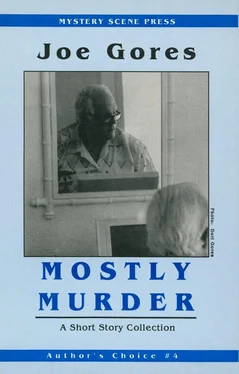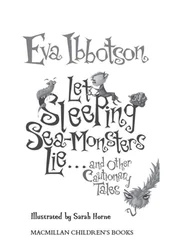“Yes?” Her voice was husky.
The screen door was unlocked so Falkoner stepped in. When the light touched his features she went stark white and her mouth dropped the hairpins. She ran against him, slanted dark eyes smoky with terror, but he pushed her back.
“Rather a come-down, Genevieve,” he said.
He went through the inner doorway to see a small dirty kitchen with dishes piled in the sink, and a bedroom with a double bed that looked as if two large animals had been fighting on it. The room had a close, intimate smell. As he donned a pair of thin gray gloves he let Genevieve’s voice draw him back to the front room.
“What does he want with me? He — whoever killed Max... I didn’t see who killed Max.”
“If you hadn’t left Arizona he might have believed you.”
“I got tired of the stinking desert and the stinking men with only one thing on their stinking minds.”
Falkoner raised his eyebrows. “The men at the Mex place are different? The desert here is different?”
“I had to eat.” Her mouth made the next word a curse. “Men. You and Mr. David and all the rest. Money and power and women, that’s all you want.” Then the strength left her and her hands crawled up the black dress like broad white spiders to her bosom.
“Isn’t he ever going to let me live in peace?” she whispered.
Falkoner asked: “Did you really think he could let you live at all?” His quick hands closed around her throat like an act of love.
She scrabbled wildly at the iron-hard forearms, reached for his eyes, tried to kick him. She was strong, but the piano-player fingers possessed all the immeasurable strength of evil. A chair was overturned. They went around the table in a slow grotesque dance like cranes mating. He drove her down on the couch and kneed her viciously. The thrashing body, the smell of sweat and perfume aroused him: it was a pity there was no time to have her before she died. A great pity.
Her face darkened, her movements became erratic, lost volition, ceased. Finally her tongue, pink as a baby’s thumb, came out of one corner of her mouth and spittle ran down her cheek. There was a muted sound like cloth tearing. She sprawled under him in a lewd doll-pose of surrender, eyes staring beyond him into the infinite horror of death.
From a payphone at a gas station on South Palm Drive, Falkoner reversed the charges to a Tuxedo exchange number in San Francisco. While awaiting his connection he placidly smoked a cigarette. The operator said:
“I have a collect call for anyone from a Mr. Simmons in Palm Springs. Will you accept the charges?”
A flat voice answered: “Put him on.”
Falkoner ground out his cigarette against the window of the booth and said “Yes” into the receiver. There was no response so he hung up, paid for his gas, and left Palm Springs, driving west across the desert on U.S. 101. At U.S. 99 he went north to Colton, cut across to U.S. 66 on a dirt road, and again pointed the Mercury at the far thin glow of Los Angeles. He counted bugs as they squashed against the windshield, and at nine o’clock ate Mexican food in a small adobe diner. It had been a clean hit: her body, wrapped in a blanket, was stuffed in the spare tire well under the floor section of the Mercury, and a suitcase full of her personal things rode beside him. Yet he lacked the usual drained empty peace. Around midnight some instinct made him pull in at a motel near Glendora, two hours from the city.
The single row of white cottages was neat and freshly painted; each unit had a covered carport with a door leading directly inside. Above the first cabin a large red neon sign proclaimed MOTEL with vacancy underneath in smaller pink letters. After he had rung the bell twice, the office light went on and an old man with a sour face like the taste of lemon came out of the back room rubbing his eyes. An old-fashioned nightshirt covered bowed legs.
“Is your last unit in the line empty?”
Clicking his false teeth together, he leaned past Falkoner as if to make sure there was a last unit. He smelled sourly of sleep.
“Yep.”
“Fine. I have trouble sleeping if I can hear traffic passing. How much?”
“Five bucks.”
“Commercial rates.”
“Well — four, then.”
Falkoner did the other careful things the years had taught him: wrote ‘Simmons’ on the register in a slanting backhand script that was not his own, mixed up the license number in a way that could have been accidental, and took Genevieve’s suitcase with him before locking the car. Opening the motel room door, he breathed deeply; orange groves flanking the highway made the air faintly sweet. Maybe it was getting to him. Five years ago he’d never considered the possibility of anything going wrong. Tomorrow I'll dump her with Dannelson, he thought, and maybe get lined up with a little piece. I've been living like a monk lately.
“Let me talk to Danny,” Falkoner said, rubbing his eyes and cursing the gray fingers of smog reaching out from Los Angeles. Sunday morning traffic made it difficult to hear.
“Who’s calling?”
“Falkoner.”
“Falkoner? I’m sorry, Mr. Dannelson is out.”
Falkoner squeezed the receiver tightly. The palm of his hand had gone sweaty.
“Is Dannelson out or did he say he was out?” he asked.
“Mr. Dannelson is out.”
There were muttered angry words, a click, and Dannelson’s voice came jovially over the wire.
“Hello, Jack? That damned fool didn’t get your name right. Listen, boy, S.F. said you had a parcel for us. Where in hell are you?”
Falkoner hung up abruptly, returned to the car, and tuned the radio to a ten o’clock newscast. It carried the item for which Dannelson’s clumsiness had prepared him.
Palm Springs police were investigating the disappearance and possible murder of Genevieve Ostroff, fortune-teller at the Green Cactus bar in Palm Desert. Two boys playing near her house had seen a man carrying what looked like a blanket-wrapped body to her black station wagon. Investigating police had found no sign of violence and her clothes had been gone, but there had been over seven hundred dollars in small bills under the paper lining of a dresser drawer. After the first newscast Chester Langly, parking lot attendant at the Blue Owl, had furnished the description of a man who had hitched a ride with him from the airport to a point near Genevieve’s house. A man who had called himself Simmons.
Damn that fairy Langly, Falkoner thought. The police were easy, but Mr. David had given him the contract for Genevieve personally... now he was too dangerous to live. The word was already out: lucky Danny’d been so anxious. Los Angeles and Las Vegas and San Diego — probably Tucson and El Paso, too, because they’d figure him to try for Mexico. No place to run: and to run would mean admitting to himself he was afraid. Suddenly his pale morose face cleared. What if he went back to San Francisco after Mr. David? That was it. It was what they should expect of Jack Falkoner.
The maid had finished his room. He paid at the office for a week in advance, then carried the heavy unwieldy package that was Genevieve in through the side entrance and dumped it on the bed.
A light blue 1955 Ford pulled out behind him on the traffic circle at Bakersfield. The tail job was clumsy. Falkoner drove fast: this boy mustn’t have time to get to a phone. On the new freeway north of Delano he suddenly floored the accelerator and squealed into the right-angle turn for the Earlimart overpass, swung over to old U.S. 99, and pulled up in front of a little general store he had remembered. It was the run-down country crossroads sort of place occasionally surviving in the San Joaquin Valley. The sort of place to do what had to be done.
Читать дальше







![Джон Макдональд - The Hunted [Short Story]](/books/433679/dzhon-makdonald-the-hunted-short-story-thumb.webp)




